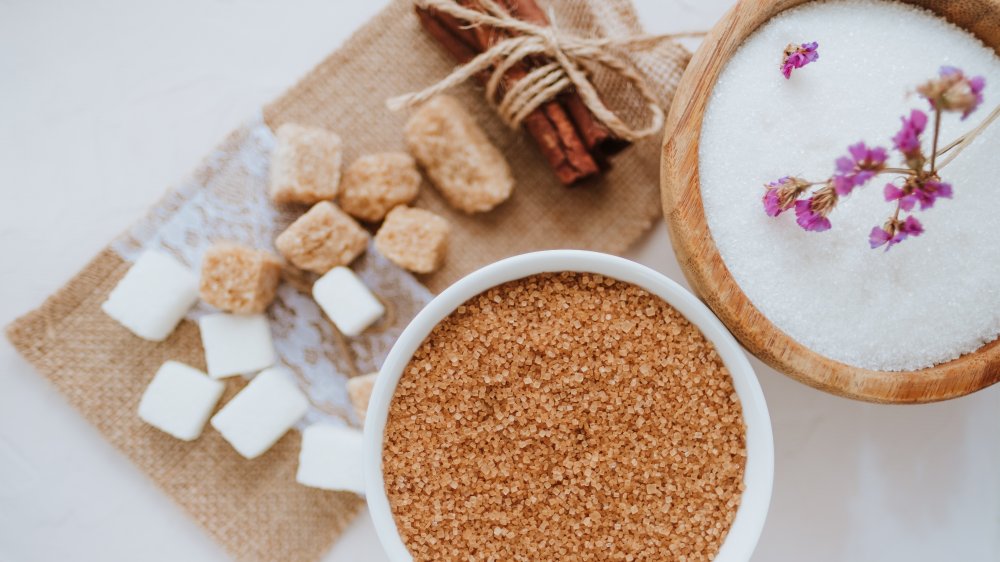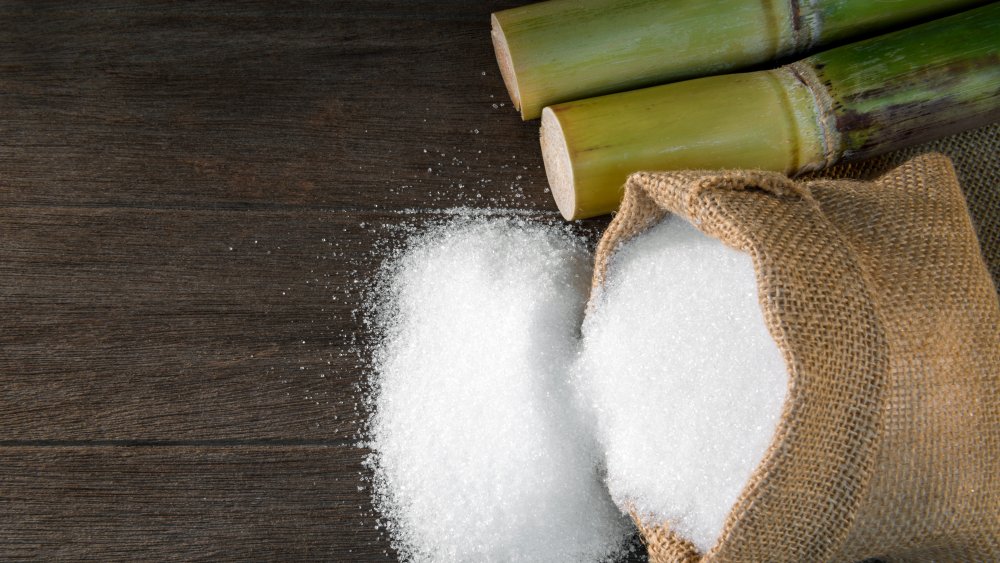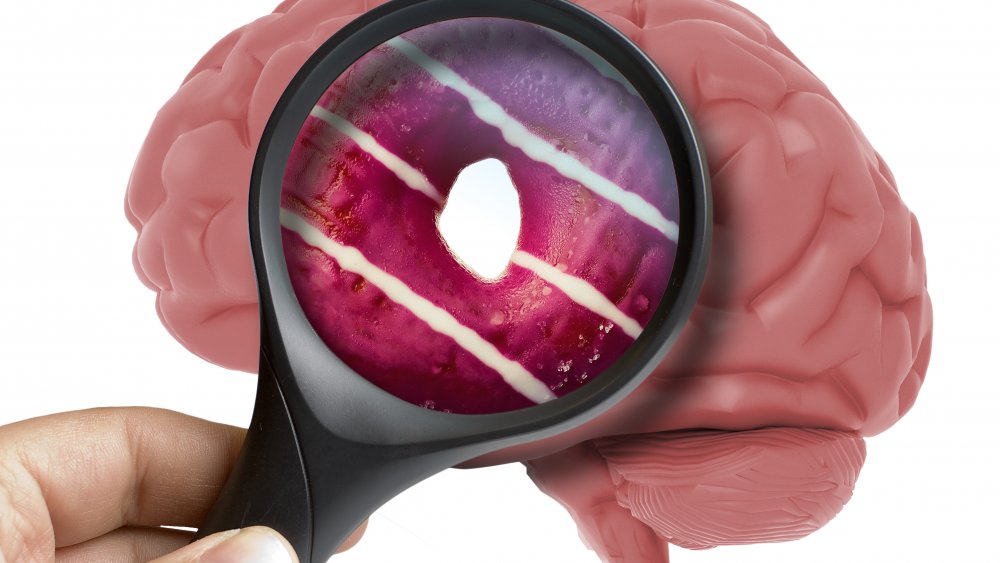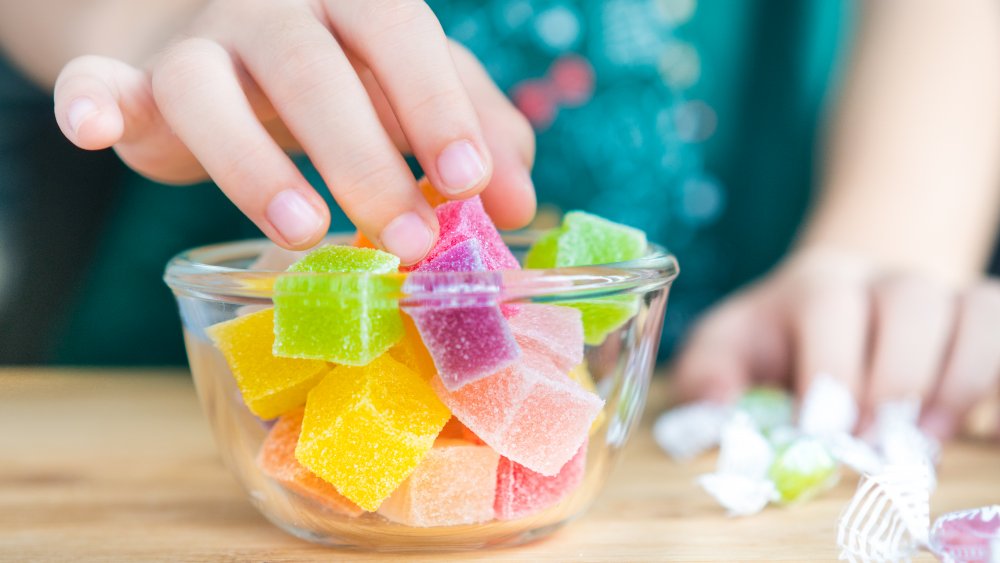The Untold Truth Of Sugar
Sugar started out as a food fit for animals in South East Asia. Then, the Ancient Romans coveted it enough that they brought it back from India at the same time as they thought to invent our modern legal system, newspapers, and the Julian calendar (via Saveur). Then, the Crusaders took off enough time from looking for the Holy Grail to bring it from Jerusalem to Europe. There, eventually, Napoleon Bonaparte would become so obsessed with it that he ordered the planting of 32,000 hectares of sugar beets while, at the same time, trying to take over the world (via The Conversation, , and Smithsonian Magazine).
And today? Even foods you consider healthy may be high in sugar. Take low-fat yogurts, peanut butter, barbecue sauce, and dried fruit, for example (via Eat This, Not That). The average American probably consumes about 76.7 pounds of sugar a year, or 22 teaspoons a day, and 20% of your daily caloric intake in the sweet stuff (via Mental Floss and The Conversation).
All of this begs the obvious question: what is sugar's deal, really? And why are why have we gone mad over it?
Is sugar a miracle drug?
You might already know that sugar does wonders for getting stains out of clothing, cleaning your coffee machine, and keeping your lipstick fresh and your flowers healthy (via CNA and Shape). But did you know it could save your life?
Back in the day, we mean back in the Middle Ages, the English used the same sugar you put into your birthday cake to treat fever, coughs, chapped lips, and upset stomachs (via Sweetness and Power). It turns out, they might not have been that far off the mark.
In 2018 the BBC reported breakthrough research on the power of sugar (yes, table sugar) to treat wounds. Amazingly, simply putting sugar on top of an open wound and then wrapping a bandage around it may work just as well as antibiotics. Why? Sugar soaks up the moisture that is a breeding ground for bacteria, reduces a wound's odor, and seems to prevent hypergranulation, or the tissue rising above the surface of the wound (via Science Direct).
The long and short of it? When applied to a wound topically, sugar might save your life. But when you drink in it as part of your daily Starbucks Frappuccino? That's a different story.
Sugar might make you stupider
At least, too much sugar is scientifically proven to make rats stupider. That's what a group of scientists found in 2012 after making a group of sugar-high rats navigate a maze, and then dissecting their brains (via National Geographic). Apparently, overdoses of sugar affected the ability of the rats' synapses to change, an ability which is key to learning any kind of new information.
Will downing too many Frappuccinos, cream sodas, or Twinkies make you, a human, dumber? Maybe. At least the neuroscientist Fernando Gomez-Pinilla, who ran the 2012 rat study thinks so. No, you're not a rat. Rats, however, are genetically similar to us and organize themselves socially in similar ways to human society (via Penn State News), which is why neuroscientists use them in experiments.
And even if sugar won't affect your brain's synapse, a sugar-heavy diet may increase your risks of dementia and Alzheimer's disease. Recent scientific studies have definitively linked higher blood sugar levels to faster cognitive decline in humans (via The Atlantic). It's enough evidence to want to start on a sugar detox, for sure. But be warned. You may be in for serious withdrawals.
Is sugar really as addictive as cocaine?
The American Heart Association recommends that women consume no more than six, and men consume no more than nine teaspoons of sugar per day (via the University Of Pittsburgh). On average, we consume more than two times that amount.
If you find yourself thinking longingly about Krispy Kremes during mealtimes, snacktimes, and all times in between, there's a reason for that. U.S. National Institute on Drug Abuse research shows that sugar can change the brain's reward center in the same way as alcohol and cocaine do (via Sugar Science). Not only can eating a sugar-rich diet cause you to crave more sugar, but a sugar detox can provoke withdrawals similar to the withdrawals a drug addict might go through during rehab, marked by irritability, fogginess, and low energy (via Addiction Center).
Angry? Blaming junk food companies might be a good place to start. Most big food companies employ teams of food scientists and millions of dollars to engineer products with just the right amount of sugar to create "the bliss point" (via CBC News). It turns out that "the bliss point" works something like a "designer drug." You can eat and eat (and eat) foods that have "the bliss point" without ever feeling full (via CNN). Needless to say, that's good for profits.
We've become slaves to sugar. And perhaps because sugar is so addictive, over the last decade researchers have uncovered alarming evidence that suggests we're also enslaving people to produce it.
The hard truth behind modern day sugar slaves
You're looking at Haitian workers harvesting sugar cane. During the 18th century, Haiti was the leading sugar-producing colony in the Americas. Over half of all slaves brought to the Americas were forced to work on sugar plantations. Haiti, in particular, bought more than twice the number of slaves than were imported into the United States (via National Geographic).
But this picture isn't from the 18th century, and it isn't from Haiti. It was taken in 2013 in the Dominican Republic, where Haitian slave labor remains a problem. The nation's sugar industry profits off of forced laborers from Haiti, who are tricked into migrating to the Dominican Republic with promises of employment. After reaching the country, Haitians are stripped of their passports, housed in barracks patrolled by armed guards, and forced to work 14 hour days (via Food Empowerment Project). According to a Verité investigation between 2009 and 2011, machete wounds, infected, swollen, or even severed fingers and physical abuse are all part of a day's work for these Haitian laborers. That's not all. In 2017, the country's largest sugar producers also came under scrutiny using pesticides "in such a way that many were in danger of death" (via the International Commission of Jurists).
No, not all sugar producers are human rights abusers, but be careful what brands you buy. The next time you pick up a bag from your supermarket? Consider buying Fairtrade.




